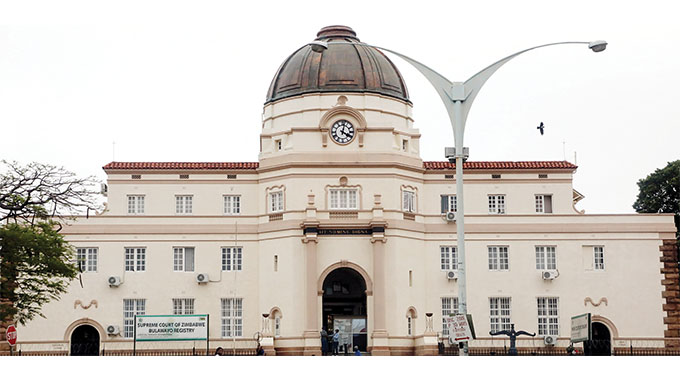Byo High Court robbers must be taught a lesson

Physical attacks on the courts are rare in our country. That is because we are generally a law-abiding society to the extent that even local criminals respect all the institutions of the State. That is also because security is traditionally, or so we thought, tight around the facilities.
While it is common in some countries for criminals to raid police and army camps, to rob soldiers or police officers in uniform and making off with guns that are never recovered, such incidents seldom happen locally. Courts, like police or army camps or prisons are specially protected facilities. In the few cases when attacks on the courts occur, one would expect them to be on lower courts.
However, we reported yesterday one of the rare attacks, not at a magistrate’s court in remote Malipati or Mbire, but at the Bulawayo High Court.
The raid, said to have been mounted by eight armed robbers on Sunday morning, left two police officers on guard duty injured, one of them hospitalised with serious injuries. The criminals disarmed the police officers and gained entry into the court’s criminal registry. We reported that the assailants used a grinder to gain access to the important area.
“We are investigating an armed robbery case which occurred at the Bulawayo High Court yesterday morning at 4AM,” said National police spokesperson Assistant Commissioner Paul Nyathi.
“It is said about eight suspects went to the court and attacked two officers who were on duty and these suspects were armed with pistols. After attacking them, they blindfolded one of the officers.
They then tried to force open the court’s main safe to the criminal registry’s office using a key.
“After failing, they tried again to use a grinder and, in the process, it is alleged that they were making phone calls.”
It is clear, as Asst Comm Nyathi said, that the robbers or those who had sent them to commit the crime, have inside information on what the court looks like. It is also clear that all they wanted was to access the registry where prosecution documents and exhibits are kept. We aren’t sure at this stage what exactly was seized, but we can reasonably guess that the criminals and their handlers were out to steal and destroy incriminating evidence against them.
We unreservedly condemn this most flagrant attack which is not just at attack on the Bulawayo High Court, but an attack on the country’s justice delivery system.
We are disturbed that this brazen robbery happened a few weeks after two men committed an equally condemnable attack on soldiers at a base in Chivhu. One of the soldiers died in the attack while another was injured. The Chivhu incident frightened many. If soldiers on duty could be attacked, disarmed and killed, how about the unarmed and untrained civilian population, we asked ourselves. Fortunately for all of us, the security forces responded swiftly and in equal measure, gunning down both gunmen hours after they had committed their cowardly crime.
The swift and firm response that law enforcement agents took after the Chivhu attack is what we expect in response to the Bulawayo High Court break-in. We cannot have people not only disarming and battering police officers but, having done so, also breaking into our courts and getting away with exhibits and other items important in the delivery of justice. We cannot have people committing crime in our courts having already done so outside of the courts. We cannot have criminals being law unto themselves.
As police chase after the Bulawayo High Court robbers, we expect them to review their security protocols not only at that court but at others countrywide as well. We reported that two police officers were disarmed and injured on Sunday, which suggests that the Bulawayo High Court is, or was at the material time, guarded by only two officers. We think more officers can secure that important building better.
In addition to deploying more personnel there and elsewhere, the Government might want to consider deploying more technology at these places. Such technology should be for surveillance purposes and also to make the facility and similar ones countrywide, impenetrable.











Comments